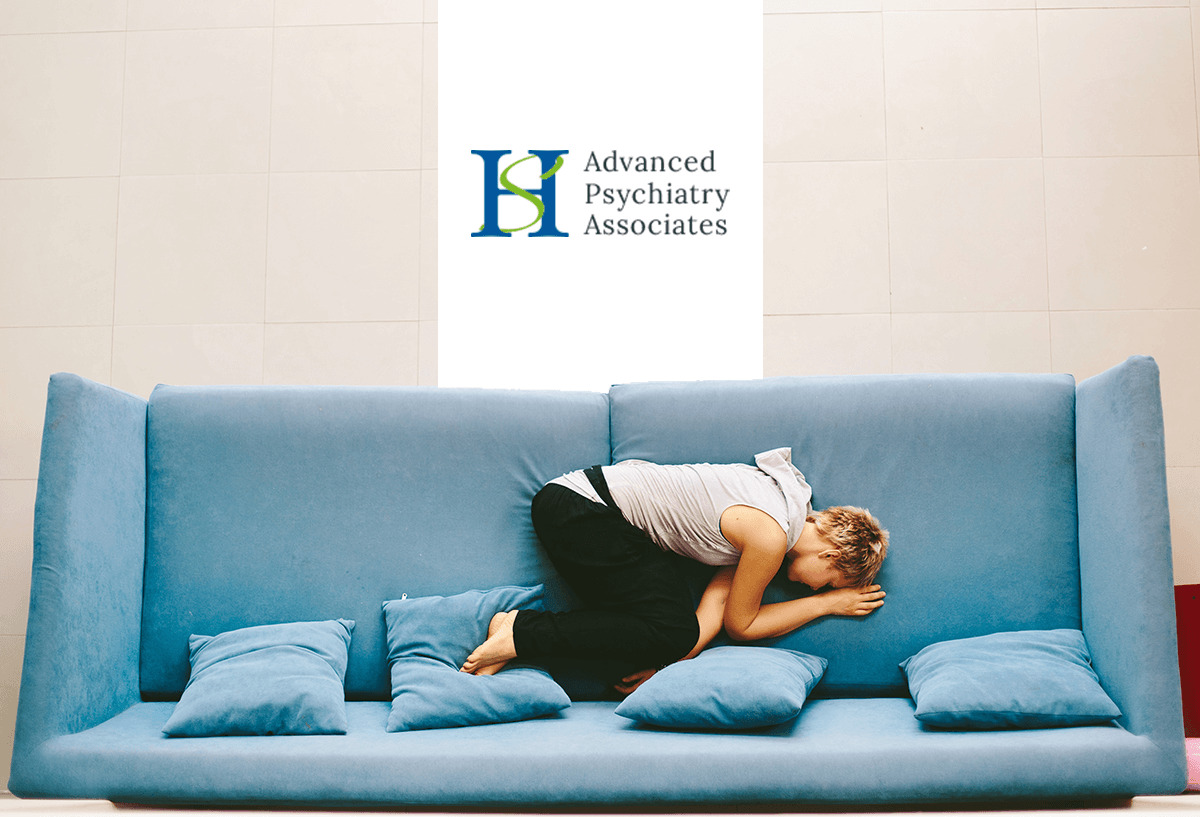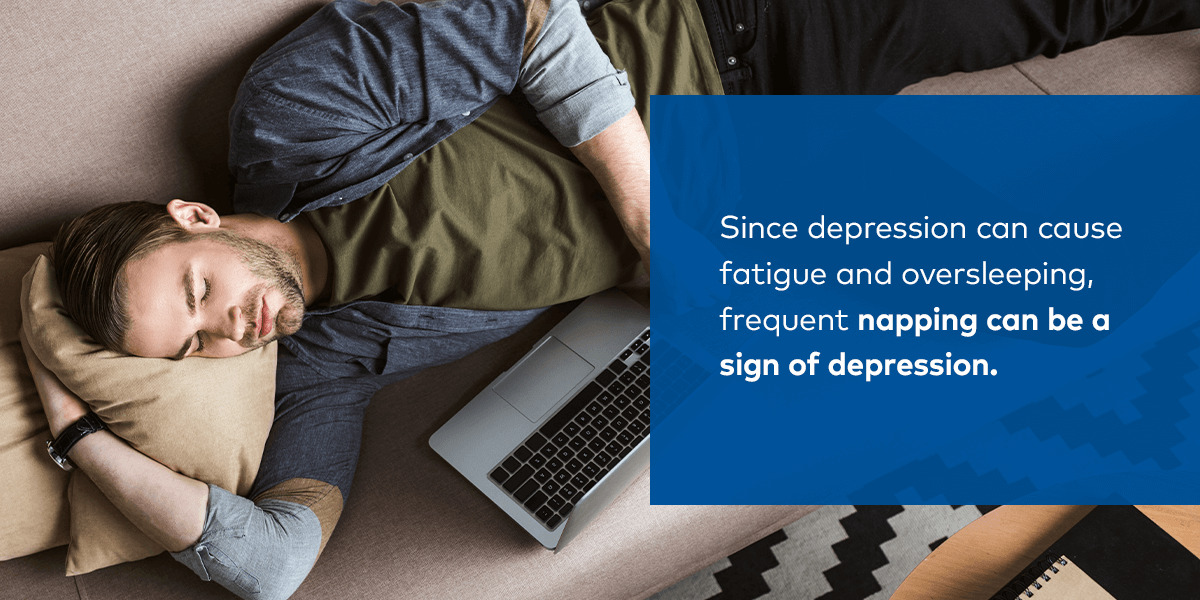
March 6, 2023
Depression Naps
Napping can indicate the presence of depression, a sleep disorder or a lack of proper sleep practices. Sleep has a strong connection to mental health, and fatigue is a common symptom of depression, though not always a definite sign. Understanding the differences and connections between depression sleep and other sleep complications can help you determine if depression treatment could benefit you.
The Connection Between Sleep and Mental Health
Adults need at least seven hours of sleep per night to maintain good physical and mental health. Adequate sleep improves mood, reduces stress, helps individuals think clearly and reduces the risk of developing physical health conditions.
The Centers for Disease Control and Prevention (CDC) recommends that you do your best to go to bed and get out of bed at the same times every night of the week, including weekends. It’s also important to avoid taking long daytime naps.
Remember, your regular approach to sleep should include sticking to a dedicated schedule of sleeping roughly the same seven to eight hours a day. Additionally, the American Academy of Sleep Medicine recommends you do the following to help ensure healthy sleep habits:
- Get out of bed if you don’t fall asleep inside of 20 minutes
- Avoid consuming caffeine, alcohol or excess fluids right before bed
- Get regular exercise and maintain a healthy diet
- Don’t eat a big meal before bed
- Turn off your phone, TV and other electronics at least half an hour before sleeping
While short naps can be healthy, naps longer than 45 minutes can interrupt your regular sleep pattern and hinder your ability to fall asleep at night. Getting inadequate sleep can cause depression, and depression can cause individuals to take long naps throughout the day. However, frequent napping does not directly indicate a person has depression.
Symptoms of Depression
Depression can cause a wide variety of symptoms. An individual who has depression may experience some or all of the following symptoms:
- Feelings of pessimism or hopelessness
- Irritability and frustration
- Feeling worthless or helpless
- Restlessness
- Decreased interest in previously-enjoyed activities and hobbies
- Feelings of guilt
- Sadness
- Anxiety
- Feeling emotionally numb
- Difficulty concentrating
- Poor memory
- Decreased decision-making abilities
- Appetite changes
- Unexplained weight changes
- Body aches and headaches
- Unexplained digestive symptoms
- Thoughts of suicide
- Fatigue, sleepiness, oversleeping or difficulty sleeping
Differences Between Depression Naps and Other Sleep Habits
Since depression can cause fatigue and oversleeping, frequent napping can be a sign of depression. It can also worsen depression by disrupting an individual’s sleep patterns and decreasing mood. However, a person might take long naps for any of the following reasons:
Burnout or Exhaustion
Burnout or exhaustion can cause individuals with or without depression to take long naps during the day. Long work hours, family obligations, excessive activity levels, everyday stress or staying up too late can cause a person to become exhausted or burnt out, leading them to take naps when they can.
While a person can experience exhaustion and depression at the same time, taking a nap out of exhaustion is not a definite sign of depression. To determine if depression is present, it’s important to consider if someone experiences additional symptoms.
Sleep Disorders
There are over 80 types of sleep disorders, and they can overlap with mental health conditions such as depression.
Further, sleeping disorders even appear to lead to mental health conditions in many instances. It’s important to be aware of any potential sleeping disorders you might have. However, taking naps is not a guarantee you have or will develop a mental health condition. Be aware of this possibility, and consult your doctor for mental health treatment if you think you’re at risk, but you shouldn’t jump to conclusions.
Characteristics of Depression Naps
Recognizing the difference between regular naps and depression naps can be challenging because fatigue or exhaustion can occur whether or not an individual has depression. Your napping habits may be related to depression if you experience additional depression symptoms or experience insomnia at other times such as when you try to sleep at night.
You can also tell if napping habits are related to depression by improving your sleep habits. If you take steps to practice proper sleep hygiene and start to feel better, sleep deprivation may be the cause of your naps. However, depression may be the cause if your napping continues after improving your sleep habits.
What Depression Naps Mean
Taking depression naps can indicate a person needs an improved sleep routine or mental health treatment. While napping is not always a sign of depression, frequent napping combined with additional depression symptoms is a sign that an individual may need treatment.
If you take naps because you feel tired throughout the day but otherwise experience a positive mood and maintain interest in your usual activities, improved sleep hygiene may reduce your daytime sleepiness. However, if you take naps to avoid uncomfortable depression symptoms, treatment may be more beneficial.
Some people with depression, anxiety and other mental health conditions may take naps to escape the symptoms of their conditions when they’re at their worst. After all, what’s more soothing and relaxing than drifting off to sleep? Crawling into bed, pulling the covers up and taking a nap to avoid the world can feel like a nice escape in the moment. However, avoiding worries and challenges doesn’t eliminate them.
While depression napping may seem like a harmless activity that temporarily numbs depression symptoms, it can be a much more serious issue. Poor sleep habits can increase depression symptoms, and long depression naps can hinder a person’s ability to get adequate sleep at night. Additionally, maintaining a healthy sleep schedule is an effective coping strategy for depression.
Seek Depression Treatment From Advanced Psychiatry Associates
Fatigue, exhaustion and frequent napping can be a sign of depression, so it’s important to seek treatment if you notice additional signs such as loss of interest or low mood. Advanced Psychiatry Associates offers a wide variety of mental health services such as depression diagnosis and treatment. Our experienced staff provides high-quality, individualized treatment to help individuals live productive, fulfilling lives. Request an appointment to learn more and seek treatment for you or a loved one.


